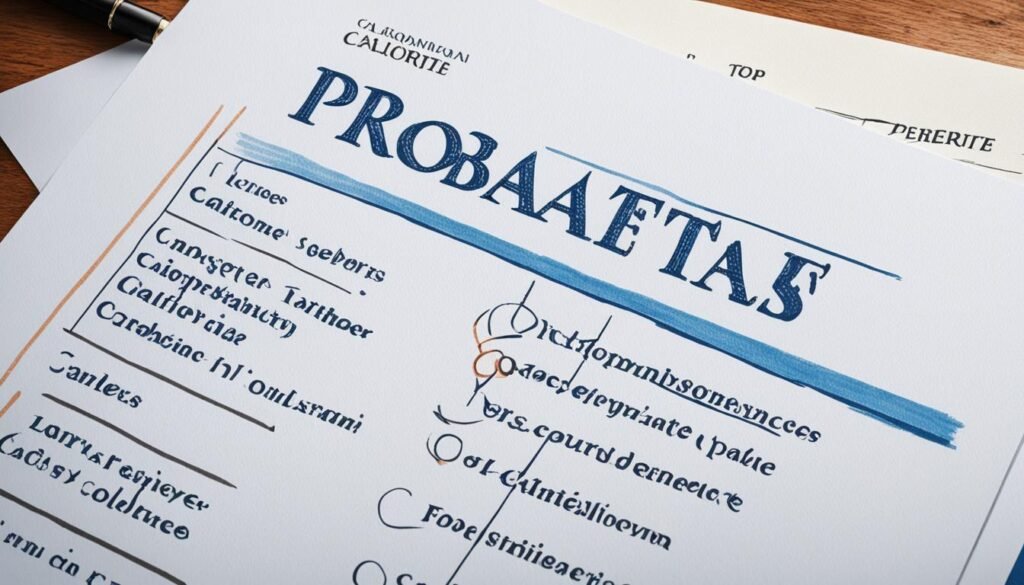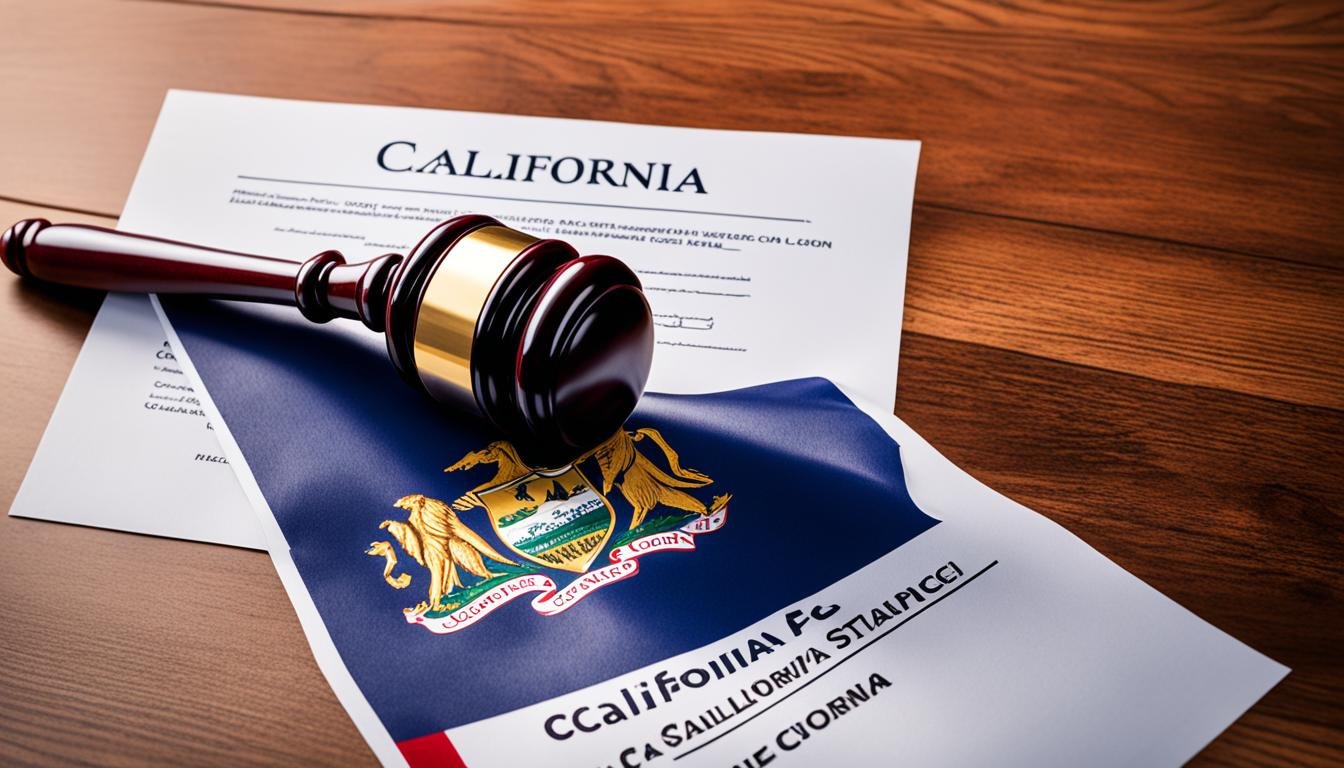In California, the probate process can be complex and overwhelming for many families. It takes about1 9 to 12 months to finish all steps. But, knowing the basics of probate can help you handle it better. This guide will answer your top questions about probate in California. It will help you make smart choices about your estate planning and administration.
Key Takeaways
- The standard for a small estate in California is currently defined as consisting of property worth less than $184,5001
- Larger estates tend to have more complexities and may require more elaborate asset management1
- Federal estate taxes in California affect estates valued over approximately $12.92 million in 20231
- California law determines heirs when there is no will, usually a spouse, domestic partner, or close relatives1
- A surviving spouse or domestic partner in California may receive property outright without any court proceeding1
Understanding the Probate Process in California
Probate in California is a legal process that handles the estate of someone who has passed away2. It makes sure the estate is managed and split up correctly. This process is overseen by the court and follows the California Probate Code2. It includes steps like listing the decedent’s assets, figuring out who gets what, paying off debts and taxes, and then giving out the rest2.
What is Probate in California?
Probate in California is the legal way to check if a will is valid and make sure the decedent’s assets are given out right2. It’s key for protecting the rights of the people who inherit things and those who were owed money2.
When is Probate Required in California?
Probate is needed in California if the estate is worth more than $166,250, unless it’s a small estate2. Some assets, like those in a trust or with a named beneficiary, don’t go through probate3.
For estates worth less than $184,500, there’s a simpler probate process3. This includes using a small estate affidavit or a spousal property petition3. This makes it quicker and cheaper to get things sorted out3.

Whether probate is needed in California depends on the estate’s value and the type of assets, and if there’s a will2. Knowing about probate and estate planning is key to making sure wealth is passed on smoothly in California2.
Types of Probate in California
California has three main types of probate proceedings for handling the estates of people who have passed away. These are formal probate, ancillary probate, and summary probate. Each type has its own rules and timelines4.
Formal Probate
Formal probate is the longest and most detailed process, taking about 9 to 12 months or more4. It’s needed when the estate has more than $184,500 (as of 2023) and doesn’t fit the simpler summary probate. This process includes checking the will, picking an executor or administrator, listing all assets, paying debts, and giving out the remaining assets to the heirs or beneficiaries.
Ancillary Probate
Ancillary probate is for when the person who died didn’t live in California but owned property there. It makes sure the California property is given to the right people, following the decedent’s wishes or state laws. This type of probate is needed to transfer the California property to the heirs or beneficiaries.
Summary Probate
Summary probate is for estates worth less than $184,500 (as of 2023) or if everything goes directly to the spouse who is still alive4. It’s a quicker and cheaper way to settle the estate. This process is faster than formal probate and helps in distributing the decedent’s assets efficiently.

Dealing with probate in California can be tough, but knowing the differences between these types can guide you. Whether it’s formal, ancillary, or summary probate, getting help from a skilled probate lawyer is key for a smooth process45.
Probate FAQs California: Navigating the Process
In California, people often wonder how long probate takes and what it costs. Knowing these can help you prepare for estate administration.
How Long Does Probate Take in California?
Probate in California can take a minimum of 9 months to 1 ½ years or more6. The time depends on the estate’s complexity, the number of assets and creditors, and court delays.
For estates worth less than $166,250, there’s a quicker probate process6. Also, certain assets like joint tenancy and living trusts avoid probate court6.
What Are the Costs of Probate in California?
Probate costs in California range from 4% to 7% of the estate’s value7. These include court fees, publication fees, bond premiums, appraisal fees, and fees for executors and attorneys.
Working with a probate attorney can save time and money6. They can help manage expenses. Creditor claims must be filed within four months of the probate start6.
The final probate costs depend on the estate’s complexity and legal help needed7. Getting professional advice can make the process smoother and cheaper.
“The assistance of a probate attorney can potentially save time and money compared to handling the process independently.”6
| Probate Estate Value | Attorney Fees |
|---|---|
| First $100,000 | 4% |
| Next $100,000 | 3% |
| Subsequent $800,000 | 2% |
Representing yourself with probate help can cost $4,500, which might be cheaper than traditional attorney fees7.
Remember, probate in California is complex. The timeline and costs vary by estate details. Getting professional advice ensures a smoother probate process67.
Wills and Estate Planning in California
In California, knowing about the different will types and what happens without a will is key. The state accepts witnessed wills, holographic wills, and statutory wills8. These wills must follow certain legal rules to be valid during probate.
Understanding Different Types of Wills
A witnessed will is the most common in California. The testator signs it with two adult witnesses who also sign9. Holographic wills are handwritten and don’t need witnesses but still have legal rules. Statutory wills are pre-made forms from the state, making them easier for some people.
What Happens If There Is No Will?
If someone dies in California without a will, they’re considered to have died “intestate.”8 Their assets go to their family based on California’s intestacy laws9. This can cause problems, showing why estate planning is so important.
Having an estate plan is key in California, no matter the estate size9. It helps distribute assets as the person wanted and avoids probate issues10. Knowing about will types and dying without one helps Californians protect their loved ones and legacy.
“A comprehensive estate plan may include both a will and a trust in California.”8
Assets and Probate in California
When someone dies in California, their estate may need to go through probate. This process covers all their property and assets. It’s important to know which assets go through probate in California and which are exempt from probate. This knowledge helps with estate planning.
What Assets Go Through Probate?
Probate is usually needed for assets held only in the decedent’s name. This includes real estate, bank accounts, and investments11. The process involves choosing a personal representative to manage the estate. They handle the estate’s assets, bills, and give them to the heirs11. Assets that go through probate are those not covered by California’s probate exemptions12.
Assets Exempt from Probate
Some assets can skip the probate process in California. These are assets in a revocable living trust, accounts with POD or TOD beneficiaries, and property owned jointly with survivorship rights1312. Also, probate isn’t needed for estates worth less than $100,000 in California13.
| Probate Required | Probate Exempt |
|---|---|
|
|
Knowing which assets go through probate in California and which are exempt from probate helps people make smart choices. They can avoid probate and make sure their assets go where they want. Talking to an estate planning lawyer is a good idea. They can help with probate in California and plan for asset management and transfer111312.
Conclusion
Navigating the probate process in California can be complex. This guide has given you key info on probate, its types, timelines, costs, and the role of wills and estate planning. Understanding the probate system in California helps you make smart choices for your loved one’s estate. This ensures a smooth transfer of assets to your chosen beneficiaries.14
If you need more help, the Super Attorneys Of Irvine team is ready to guide and represent you in the probate process. Probate attorneys California can help you with California probate laws and probate court procedures California. They ensure your estate administration California is done right and follows California inheritance laws15.
This guide has covered the probate FAQs California and the probate timeline California and probate costs California. It gives you the info you need to decide on avoiding probate California and managing your loved one’s estate. With the right help and tools, you can go through the California probate process with confidence. This way, your wishes will be respected1514.
FAQ
What is probate in California?
When is probate required in California?
What are the different types of probate in California?
How long does probate take in California?
What are the costs of probate in California?
What types of wills are recognized in California?
What happens if someone dies without a will in California?
What assets go through probate in California?
Source Links
- https://store.nolo.com/products/how-to-probate-an-estate-in-california-pae.html
- https://www.snyderlawpc.com/understanding-the-probate-process-in-california/
- https://keystone-law.com/how-does-probate-work/
- https://www.courts.ca.gov/8865.htm
- https://trustandwill.com/resources/probate-process/california
- https://ridleylawoffices.com/the-california-probate-process-step-by-step-guide/
- https://guidewaylegal.com/navigating-the-probate-process/
- https://www.theprobateguy.com/california-probate-estate-planning-faq/
- https://ssslegalconsultancy.com/resources/estate-planning-faq/
- https://www.ssslaw.com/faqs/estate-planning/
- https://selfhelp.courts.ca.gov/probate
- https://www.cunninghamlegal.com/california-legal-services/how-to-do-probate-in-california-on-your-own-or-with-legal-help/
- http://www.davidshapirolaw.com/practice-areas/probate/probate-faq/
- https://www.ca-trusts.com/probatefaq.html
- https://www.probateattorneysanfrancisco.com/probate-information.html

